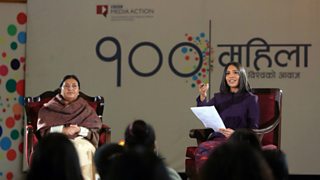What happens when you put 100 women in a room with Nepal’s first female president? Our Sajha Sawal (Common Questions) presenter describes some of the discussions which came out of a very special debate show.
I met Bidhya Devi Bhandari – Nepal’s first female president – a while back while presenting an episode of (Common Questions), a weekly TV debate show giving communities in Nepal a chance to question their leaders. Since our names are the same, she teasingly suggested that I should be her mitini (name sister in Nepali). Given the connotations that go with being a mitini – being supportive and unchallenging – my journalistic side kicked in and I replied, “I can’t be your mitini… as I can’t take your side; instead I have to ensure that all the questions people ask, are answered.” I’m still thinking of that moment and wonder if Nepal’s president remembers.
100 Women
Last Friday was a special day for me. As part of the 主播大秀's season, which shares powerful and moving stories from inspirational women across the world, Sajha Sawal had organised an interactive programme with 100 Nepali women and Bidhya Bhandari – just a few weeks into her presidency.

Being the presenter of the programme, my excitement knew no bounds. I was keen to hear from the all-female audience; their stories of struggle, success, resilience and empowerment. I was confident about our purpose for the day – a celebration of lives of 100 Nepali women from different social spheres and religions – inspiring other women to bring about positive change in our society.
The programme was scheduled for noon in a hall at the president’s residence. Gathered there were established female professionals, actors, pilots, doctors, army personnel and police officials – many of them the first in their field – intermingling with activists, retired civil servants, and schoolgirls. I felt hugely privileged to be amongst them and to be able to share and learn from their experiences.
As the president attentively listened and answered the participants’ questions, I felt as though the conversations were happening between friends and sisters, not with a head of state. At times the president mentioned how similar her stories were to theirs. Acknowledging the struggles a labourer had faced when she’d lost her husband, Bidhya shared how she too is a single widowed woman and understood the hardships one goes through when raising kids alone.
I was impressed by the breadth of discussion. Topics ranged from the moving story of a rape survivor to the powerful account of a women from the Chepang community (an indigenous Nepali tribe) – and how, against the odds, she’d managed to complete a bachelor’s degree and find a job to support her family.
My dream is to become the prime minister
I was particularly delighted to see a schoolgirl stand up and say, “My dream is to become the prime minister of our country. How can I go about achieving this dream?” Her query and the zeal with which she spoke gave a very positive portrayal of the aspirations of a younger generation.
As the debate concluded, Bidhya Bhandari promised that she would work as an active advisor for the government in uplifting the lives of women in Nepal. Her call for all the women was that, to tackle inequality between men and women in Nepal, women shouldn’t look to pull men back, but work four times harder to catch-up with them.
I don’t know if the president will ever be my mitini, but that day I felt all 100 women in the room were my mitinis – related by similar aspirations of freedom, equality, dignity and determination, to live the lives we want to live.
Related links
Follow Sajha Sawal on and
